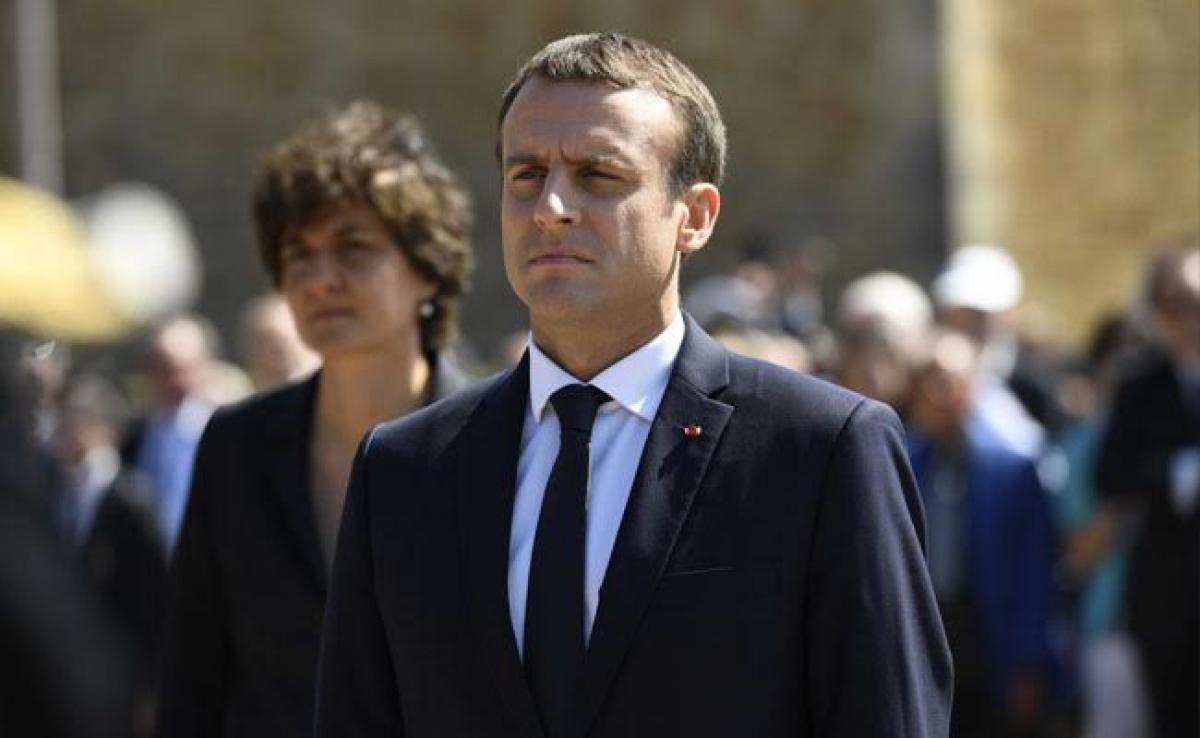Live
- Civic chief inspects Smart City project works
- PDSU flays govt apathy in solving students’ problems
- Contribution of tribals to freedom struggle ignored
- Modi dividing society: Pawar
- Downing Street says sorry for wine, non-veg food in Diwali menu
- Lokesh hailed for withdrawing cases against employees
- India’s economy in sweet spot with strong growth: Moody’s
- YSRCP govt failed to release sufficient funds for medical colleges, flays Minister
- Revanth offensive ahead!
- Resolve land-related issues in a transparent manner: Collector
Just In

President Emmanuel Macron began fine-tuning his government team on Monday after his centrist party redrew France\'s political map with a resounding victory in parliamentary elections, dealing him a strong hand to forge ahead with pro-EU, business-friendly reforms.
President Emmanuel Macron began fine-tuning his government team on Monday after his centrist party redrew France's political map with a resounding victory in parliamentary elections, dealing him a strong hand to forge ahead with pro-EU, business-friendly reforms.
Macron, France's youngest-ever president at 39, asked close ally Richard Ferrand, who is embroiled in a conflict of interest scandal, to leave his cabinet and seek the leadership of the ruling Republic on the Move (REM) party in parliament.
Ferrand, under preliminary investigation over alleged favouritism towards his common-law wife in a lucrative property deal, agreed to step down as territorial cohesion minister, his entourage said. He denies any wrongdoing.
As tradition dictates following parliamentary polls, Prime Minister Edouard Philippe tendered the resignation of the entire cabinet.
Macron immediately reappointed the rightwinger and asked him to unveil a new government lineup by 6:00 pm (1600 GMT) on Wednesday, sources in the president's office said.
Although REM's sweep fell short of a predicted landslide, the trailblazing party and its centrist ally MoDem won 350 seats in the 577-seat National Assembly after Sunday's runoff vote. REM by itself, with 308 seats, has well over the 289 needed for an absolute majority.
The election was closely watched in Europe and around the world to see if Macron would secure a mandate to push through his pro-EU reform agenda.
Politically less experienced
The new parliament will be nearly six years younger on average, have a record 224 women lawmakers, and will be strikingly more varied in background -- if politically less experienced.
The party that Macron founded just 14 months ago has caused a political earthquake, even if the winning score was considerably lower than the 470 seats predicted by some pre-vote surveys.
Macron's confident start at home, where he has concentrated on trying to restore the lost prestige of the president, and his bold action on the international stage has inspired a raft of positive headlines.
Macron further burnished his diplomacy credentials on Monday by hosting Jordan's King Abdullah, saying fighting terrorism and radicalisation topped their agenda along with the crisis in Syria.
But Monday brought a stark reminder of the challenges Macron faces on the security front, when a car -- loaded with a Kalashnikov assault rifle, handguns and a gas canister -- rammed into a police van on the Champs-Elysees in Paris.
The incident follows a string of attacks, many of them targeting police, in a terror-weary country that remains under a state of emergency imposed after the November 2015 attacks in the French capital left 130 dead.
Macron wants to use his majority in parliament to pursue his agenda of loosening labour laws and overhauling France's social security system.
He has had little pushback on his stated intention to use executive orders to push through reforms without parliamentary debate -- though street protests over the erosion of cherished workers' rights, such as those seen last year, are likely to happen again.
'Civic general strike'
Newly elected radical left MP Francois Ruffin warned: "If it's a monolithic bloc which goes forward with its laws, cocksure and dominant, well, it will be outside the National Assembly that things will happen".
The parliamentary boost also strengthens Macron's hand on the European stage as the EU heads into negotiations on Britain's departure from the bloc.
The staunch europhile -- in stark contrast to presidential rival Marine Le Pen -- will take part in his first EU summit Thursday and Friday in Brussels.
He wants a leadership role in countering the kind of nationalism that far-right leader Le Pen represents, which spurred the Brexit vote and helped propel Donald Trump to the US presidency.
Macron's detractors point to a record-low turnout of just under 44 percent in Sunday's polling, saying he cannot claim to enjoy a deep vein of support.
Radical left leader Jean-Luc Melenchon described it as "a sort of civic general strike".
Later on Monday Macron said he regretted that more people did not vote but put much of the blame on the fact that other parties -- unlike his REM -- did not work to get out the vote.
"I think, whether it was the two rounds of voting, or the legislative elections, why people didn't vote, it is also because a lot of others did not mobilise," Macron said in a TV interview.
REM routed the Socialists and heavily defeated the rightwing Republicans.
Le Pen entered parliament for the first time in her career in one of eight seats won by her National Front (FN) party.
But the FN fell well short of its 15-seat target that would have allowed it to form a parliamentary group -- a status that gives a party more say in setting the agenda.
The Socialists were the biggest losers, punished for the high unemployment, social unrest and lost national confidence that marked their five years in power.
The party of Macron's predecessor Francois Hollande shed more than 250 seats, obtaining just 30.

© 2024 Hyderabad Media House Limited/The Hans India. All rights reserved. Powered by hocalwire.com







